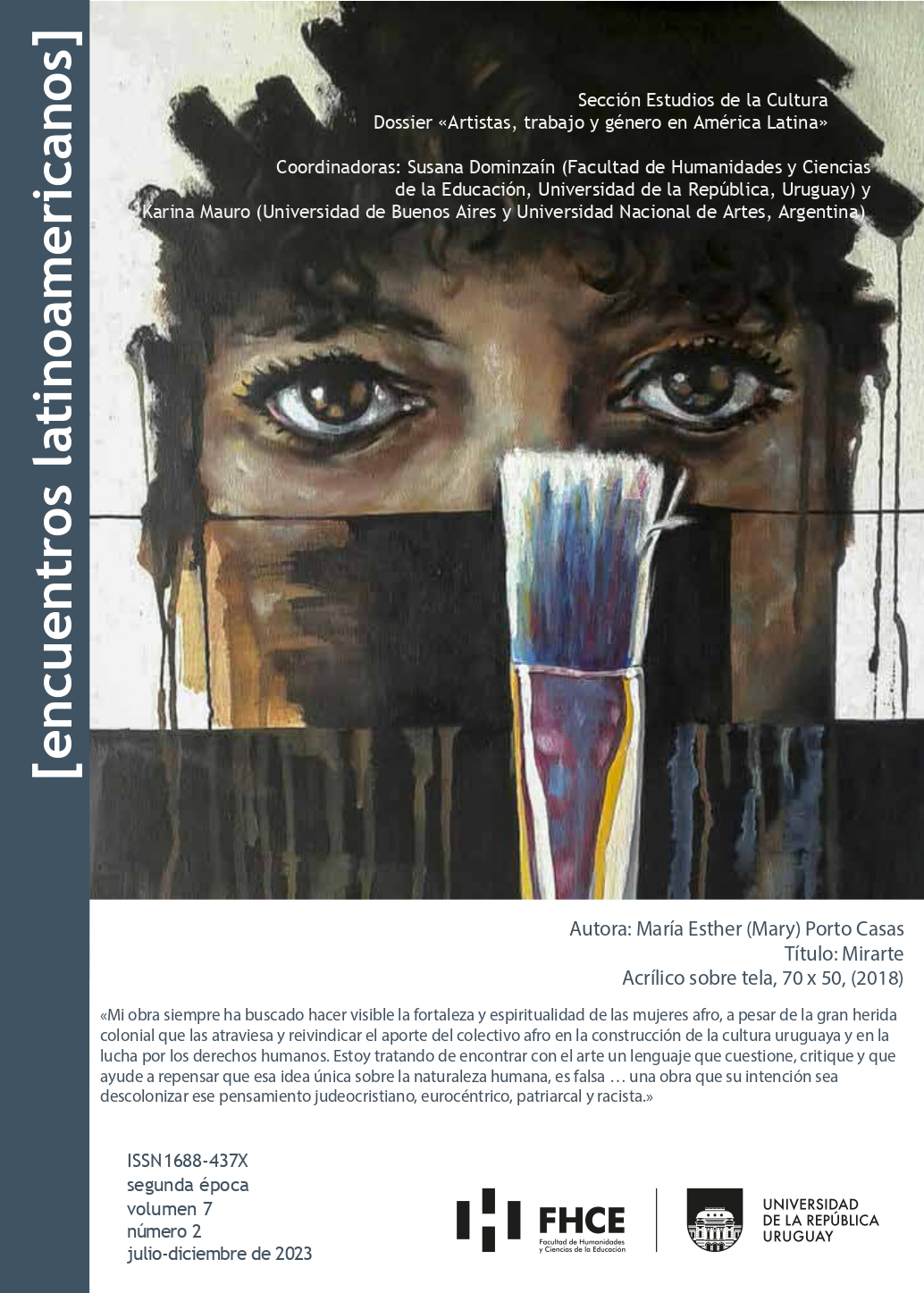Rational and relational Montevideo carnival: popular stages and women with the stage on their shoulders
Published 2023-12-28
Keywords
- tablado popular,
- mujeres,
- gestión
- popular stage,
- women,
- management
- cena popular,
- mulheres,
- gestão
How to Cite
Copyright (c) 2023 Gianela Turnes

This work is licensed under a Creative Commons Attribution-NonCommercial 4.0 International License.
Abstract
This article intends to get to know and interpret the activity of women assuming leading roles in neighborhood committees that organize popular stages in
Montevideo’s carnival. Specifically, intends to understand the ways they assume these responsibilities, their motivations, how they develop that role and how they evaluate their accomplishments and challenges. From a qualitative point of view, it starts contextualizing the subject within Montevideo’s carnival,
which includes an industrial economy perspective and an analysis from the communication and culture political economy, to then focus on neighborhood
committees managing popular stages in Montevideo’s carnival and its network. In these committees women’s predominance stands out in relation to the voluntary work demanded for the operation of these stages. By interviewing these women we intend to access to the conditions for this management and showproduction, as much as the support they get, the possibilities of group decision processes and the incidence of contract mechanisms and program schedule possibilities. This investigation aims to interpret culture constructions that are involved in this activity, crossing Cultural Studies with Genre Studies.
Downloads
References
- Alfaro, M. (2002). Los uruguayos y el carnaval. Representaciones sociales e identidades colectivas en el espacio mítico de la fiesta. Cahiers du CRICCAL, 2(28), 21-28. Recuperado de http://www.persee.fr/doc/ameri_0982-9237_2002_num_28_1_1547
- Blázquez, N., Flores F., Ríos, M. (2012). Investigación feminista. Epistemología, metodología y representaciones sociales, UNAM Centro de Investigaciones Interdisciplinarias en Ciencias y Humanidades Centro Regional de Investigaciones Multidisciplinarias Facultad de Psicología. México: Colección Debate y Reflexión.
- De Souza Silva, J. (2004). La educación latinoamericana en el Siglo XXI. Escenarios hacia las pedagogías de la alienación, domesticación y transformación. San José: Red “Nuevo Paradigma” para la Innovación Institucional en América Latina. Instituto Internacional de Investigación sobre Políticas Alimentarias (IFPRI)
- Fraser, N. (2015). Fortunas del feminismo. Del capitalismo gestionado por el Estado a la crisis neoliberal. Madrid: Traficantes de sueños.
- Hall, S. (1994). Estudios culturales: dos paradigmas. Causas y azares, (1), 27-44. Recuperado de https://ahira.com.ar/ejemplares/causas-y-azares-no-1/
- Huergo, J. A. (2002). Nuevas aventuras de la perspectiva crítica: La investigación «con» la transformación social. Nómadas, (17), 36-45. Recuperado de https://www.redalyc.org/pdf/1051/105117951004.pdf.
- Huergo, J. A. (2010). Una guía de Comunicación/Educación, por las diagonales de la cultura y la política. En R. Aparici (Comp.). Educomunicación: más allá del 2.0 (pp. 65-104). Barcelona: Gedisa.
- Martín-Barbero, J. (2006). Estética y comunicación. Signo y Pensamiento, XXV(49), 36-45. Recuperado de https://revistas.javeriana.edu.co/index.php/signoypensamiento/article/download/4636/26044
- Ministerio de Educación y Cultura. (2009). Hacia la Cuenta Satélite en Cultura del Uruguay. Montevideo: MECZona Editorial. Recuperado de https://www.gub.uy/ministerio-educacion-cultura/politicas-y-gestion/cuenta-satelite-cultura-del-uruguay
- Mosco, V. (2006). La economía política de la comunicación: una actualización 10 años después. Cuadernos de Información y Comunicación, 11, 57-79. Recuperado de https://www.redalyc.org/articulo.oa?id=93501106
- Remedi, G. (2019). La esfera pública plebeya en América Latina: prácticas subalternas, usos y significaciones. Encuentros Latinoamericanos, segunda época, III(2), 1-8. Recuperado de https://ojs.fhce.edu.uy/index.php/enclat/article/view/464/403
- Scott, J. C. (1990). Los dominados y el arte de la resistencia. Discursos ocultos. o. Ciudad de México: Ediciones Era Segato, R. (2018). Contra-pedagogías de la crueldad. Buenos Aires: Prometeo libros
- Thompson, E. P. (2002). La formación de la clase obrera en Inglaterra. Barcelona: Crítica.
- Vidart, D. (1997). El espíritu del carnaval. Montevideo: Banda Oriental.
- Williams, R. (1998). Marxismo y literatura. Barcelona: Península.


